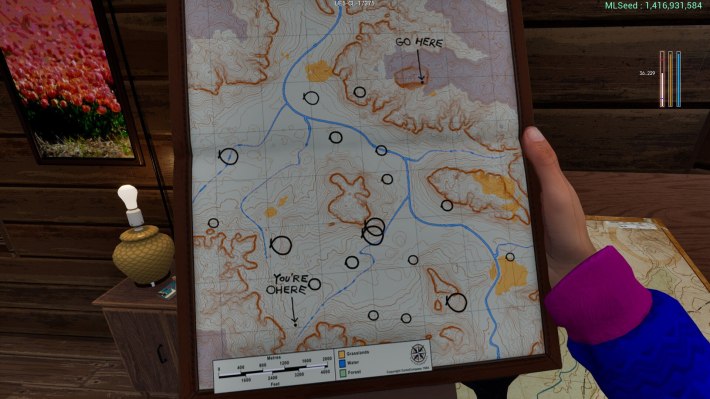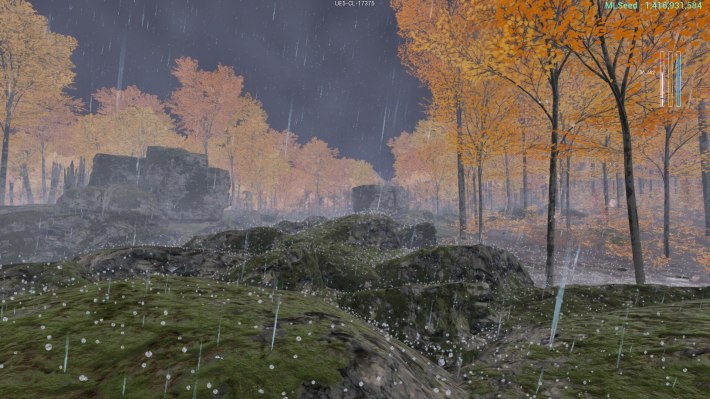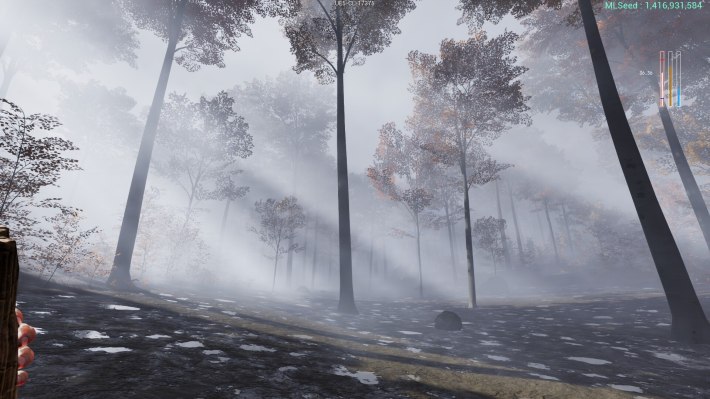Prologue: Go Wayback! is an unfortunate name for a video game, though on par for what I’d expect for a developer whose previous game was called PlayerUnknown’s Battlegrounds. The survival game–or survival-esque game? Or survival game-like?--has an early access release planned, but there’s currently a Steam demo that lets you try to figure out what exactly it is for yourself.
Prologue spreads itself between survival game, walking sim, and tech demo. Each run takes place on a new huge, generated map; you’re tasked with walking from a starting cabin to a weather station somewhere out in the world, using only a compass and a paper map that doesn’t update with your position. There isn’t any wildlife or monsters out there, just nature and a few points of interest, also marked on your map, that could be cabins, lean-tos, or piles of rocks. In its current form the game has some light survival elements in terms of managing your character’s hunger, thirst, and temperature. These aren’t terribly taxing, though letting them bottom out will end your run.
The game’s maps are created with what a writeup on Epic Games calls “a mixture of procedural generation, machine learning, and good old-fashioned handcrafted art.” This includes in-house machine learning technology to generate the heightmap and uses data drawn from, the developer says, “real-world landscape data (from public geospatial datasets).” The generation is done on the player’s machine rather than in the energy-guzzling data centers AI is known for. Developer Brendan Greene told Epic that “We try not to use generative AI for the artistic process;” while it’s not clear to me what “try” means, there’s no AI disclosure on its Steam page. The whole thing is kind of a tech test for a sort of–oh god–metaverse, with Kotaku writing that “This metaverse, a 3D version of the internet as Greene calls it, is the long-term goal, potentially 10-15 years away, guiding Prologue’s development like a north star.”
That’s a lot of the kinds of buzzwords I hate, and also not a lot of insight into what the thing you can download on Steam actually is. This might explain why I hadn’t realized a playable version of the game existed until YouTube put one of my favorite The Long Dark players messing with it in front of me over the weekend. I love The Long Dark for all the things Prologue has in common with it, namely wandering around in the woods, so I downloaded the demo to check it out. In my five hours with the demo I did not make it to the weather station, though I did glimpse it once in the distance before fog set in, I made some bad choices that got me hopelessly lost, and died.
In real life, I am not great with maps; I will admit that I sometimes can’t even parse a Google map without turning myself or my phone in different directions. Prologue’s compass and paper map setup were a huge challenge for me. The best way to navigate the demo’s world is to find the big river that crosses every map and then follow it; this also helps with your need for water, which can’t be collected from rain or puddles despite the game’s abundance of rain, puddles, and containers that can hold water. In one run, the starting cabin I spawned in was firmly between three river tributaries and a mountain; as long as I didn’t climb a mountain, I thought, it was impossible for me not to hit a river eventually. But then I kept not hitting a river or a mountain, stopping to look at my map and compass, asking myself if I even actually understood cardinal directions.

When I did find a river in a run, things were going great until curiosity got the better of me and I wandered into the woods. I kept muttering “the river is behind you, just turn around” to myself until I came upon a little lean-to that thrillingly contained a new map showing my updated position. Then, a snowstorm set in, and when it ended, I somehow didn’t just turn around and, even with my new map, couldn’t find the river again. With the world changing each time, there’s none of the learning landmarks of games like The Long Dark that help you improve over time. Given that navigation is the main activity the Prologue demo has going for it, how much you understand the concept of where your body is in space will likely dictate how challenging you find it.
As a demo, the game struggled a bit for me tech-wise, with frequent framerate drops and some effects I had to turn off to stop the leaves on all the trees from turning into weird little strobe lights. The controls can be equally finicky, sometimes not picking things up when they should. But I didn’t mind looking past this to enjoy just wandering in Prologue’s world, full of shifting biomes and weird rock formations. There is spectacular weather: in one of my runs, a powerful rainstorm started up as soon as I spawned, threatening to tear the roof off my starting cabin in a roar of water and flapping wood. There are snow storms and, captivatingly, hail. There are muddy areas that slow your walk speed and fog that obscures everything, and, less frequently, solid ground and sunny skies. With no crafting and little in the way of shelter, changes in weather can spell the end of a run.

You find food and items as you explore, though you have a clunky, maddeningly small inventory to contend with. You can also carry items under your arm; I mainly did this for firewood, since bigger pieces can be in short supply out in the world. The firestarting mechanic is great: using a firestriker you hopefully remembered to pick up in the starting cabin, you arrange tinder, sticks, and logs and then strike enough sparks for everything to catch. The placement of your fire items matters, as does the weather you’re trying to light a fire in, and it feels very much like starting a fire in the real world. One of my runs ended when I found myself slogging through a The NeverEnding Story-esque mud flat, moments from freezing to death, with the ground too wet to light a fire on.
It’s good that the fire mechanic is interesting, because otherwise there isn’t all that much to do in the demo. The landscape can become repetitive, and there’s no narrative to follow, secrets to uncover, or timer or closing circle to push you toward the weather station. I wouldn’t fault anyone who simply found it boring–its world is very beautiful, but there isn’t very much in it–or players with better navigational skills than me finding it too easy. Beyond mishaps with my fires, foraged mushrooms were enough to keep me fed and hydrated; my deaths didn’t feel inevitable so much as consequences of my own bad choices.

Despite all this, Prologue ate up a chunk of my Saturday. In the absence of so many of the things that make video games video game-like, it has its own intriguing atmosphere that feels like it has nothing to do with metaverse cringe. It isn’t exciting, or necessarily good, and I can’t even say I honestly understand what it’s trying to be. But it drew me in regardless, given my love of a slow-paced wandering game and the pleasures of exploring virtual woods. Prologue’s eventual early access release plans to add narrative, “new ways of surviving,” and “hazards to explore,” and while it definitely feels a bit too bare bones right now, I think leaning too far into the hallmarks of standard survival games runs the risk of PlayerUnknown just making a crappy survival game. PUBG’s Arma mod lineage made it wonderfully, grimly clunky, and I hope Prologue, whatever it’s developing itself into, sticks with that feeling while improving on the parts that don’t function quite right yet.
I can’t totally say I’d recommend it if you’re not a survival game nerd like me, or even if you are. But I had a hugely particular-feeling experience in it, one that had me scooted forward in my chair with my face close to my computer screen, one that told the kinds of personal, harrowing stories only a very slow survival game can, even one as baffling as Prologue.


